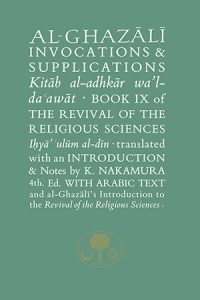Al-Ghazali The Book of Invocations & Supplications (Ihya Ulumuddin Series No. 9)

Author: Imām Al-Ghazali
Translator: K. Nakamura
Publisher: Islamic Texts Society
Year of Publication: 1992 (1st Edition), 2016
Print Length: 217 pages
Genre: Islamic Studies / Quranic Studies; Theology, Ethics and Philosophy; Islamic Law & Jurisprudence, Science; Qur’anic Reflection, Supplication & Prayers; Non-Fiction / Religious Studies
Topic: Islam, Qur’an, Supplication & Prayers
Al-Ghazali on Invocations and Supplications is a translation of the ninth chapter of the Revival of the Religious Sciences (Ihya’ ‘Ulum al-Din). This chapter falls in the sections dealing with the requirement of religion. The present volume is probably the most widely read compendium of such material, popular not only for its comprehensiveness and beauty, but also for the analytical approach of its author, who explores the psychological and spiritual effects of prayer and the celebration of God’s name.
This new fourth edition includes the invocations and supplications in Arabic for those readers who would like to use them in their prayers and a translation of Imam Ghazali’s own Introduction to the Revival of the Religious Sciences, which gives the reasons that caused him to write the work, the structure of the whole of the Revival, and places each of the chapters in the context of the others.
Table of Contents
al-Ghazāli’s Introduction to the Revival of the Religious Sciences
Publisher’s Note
Editor’s Note
Abbreviation
Preface
Introduction
Notes to Introduction
THE BOOK OF INVOCATIONS AND SUPPLICATIONS
Prologue
Chapter 1. On the General Merit and Profit of Invocation, with an Illustration from the Qur’ān, the Traditions and the Narratives
The Merit of Gathering for Invocation
The Merit of Tahlīl
The Merit of Tasbīḥ, Taḥmid and Other Invocations
Chapter 2. On the Forms and Value of Supplication and Some Transmitted Prayers; the Merit of Asking for Forgiveness and of Invoking Blessing upon the Emissary of God (may God bless him and grant him peace)
The Merit of Supplication
The Properties of Supplication, which are Ten in Number
The Merit of Invoking Blessing upon the Emissary of God (may God bless him and grant him peace) and his Virtue
The Merit of Asking for Forgiveness
Chapter 3. Transmitted Prayers whose Authors and Circumstances [of Composition] are Known and whose Use in the Mornings and Evenings and immediately after each Ritual Prayer is Desirable
Chapter 4. Prayers Transmitted from the Prophet and his Companions, with the Isnād Omitted and Chosen from the Collections of Abū Ţālib al-Makkī, Ibn Khuzayma, and Ibn Mundhir
Chapter 5. Prayers Transmitted for every Emergent Occasion
Notes
Appendix I: Persons cited in text
Appendix II: Some Important invocations
Bibliography
Index to Qur’ānic Quotations
General Index

Imām Abu Hamid al-Ghazali is a 11th century Muslim scholar. He was one of the most prominent and influential philosophers, theologians, jurists, and mystics of Sunni Islam. Al-Ghazālī was born at Ṭūs (near Mashhad in eastern Iran) and was educated there, then in Jorjān, and finally at Nishapur (Neyshābūr), where his teacher was al-Juwaynī, who earned the title of imām al-ḥaramayn (the imam of the two sacred cities of Mecca and Medina). He was active at a time when Sunni theology had just passed through its consolidation and entered a period of intense challenges from Shiite Ismâ’îlite theology and the Arabic tradition of Aristotelian philosophy (falsafa). Al-Ghazâlî understood the importance of falsafa and developed a complex response that rejected and condemned some of its teachings, while it also allowed him to accept and apply others. His great work, Iḥyāʾ ʿulūm al-dīn or Ihya Ulumuddin (“The Revival of the Religious Sciences”), made Sufism (Islamic mysticism) an acceptable part of orthodox Islam.
Source: https://plato.stanford.edu/entries/al-ghazali/
More from Imam al-Ghazali in this library, click here.

Kojiro Nakamura was a Japanese scholar of Islam. He was professor emeritus of Islamic studies at both Tokyo University and Oberlin University. Tokyo University’s Department of Islamic Studies was the first such department in Japan, established in 1982 with Nakamura appointed its first professor. Nakamura translated and commented on portions of Al-Ghazali’s Revival of Religious Sciences, his most important work, for the Islamic Texts Society in 1992. Much of Nakamura’s effort had been spent on analysis of al-Ghazali’s works, a number of which Nakamura has translated to the Japanese language. He passed away in 2023 after an illness.
Source: https://en.wikipedia.org/wiki/Kojiro_Nakamura
More from K. Nakamura in this library, click here.
